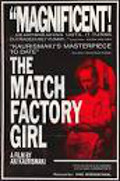
Directed by
Aki Kaurismaki
70 minutes
Rated PG
Reviewed by
Bernard Hemingway


The Match Factory Girl
Aki Kaurismaki’s marvellous little film is economical not just in terms of its running time but in its narrative form which tells its story as a series of short, largely dialogue-free vignettes.
Kaurismaki regular, Kati Outinen, plays Iris, a drab thirty-something quality-controller who works in a match factory and has an equally drab home life with her mother (Elina Salo) and bully of a stepfather (Esko Nikkari). Deciding to spice up her life she buys an eye-catching red dress and goes to a local bar where she picks up Aarne (Vesa Vierikko). He takes her back to his place for a tumble but when she discovers that she's pregnant he wants nothing to do with her. Her parents throw her out and she decides to take her revenge on an unfeeling world.
Although Kaurismaki gives his story a political resonance with quite a lot of attention given to TV reports of the Tiananmen Square protests (and for some reason the film opens with radio coverage of an Australian rugby league game), the film works best as an ironically existential portrait of life’s inequities.
Whilst the television shows the way of the world, there is a strong sense here that when life is so unfair the world of imagination is the only consolation. Thus Iris is a fan of Sergeanne Golon's period novels of which she has a collection on her bookshelf, and is presumably taking her lead from ‘Countess Angelique’, a quote from which opens the film, concerning a young woman's quest for vengeance upon those who have done her wrong. The gallows humour, amplified by Timo Salmonen’s lean camerawork and a selection of retro rockabilly songs, comes from the fact that Iris doesn’t keep the two world separate. Indeed why should she? The phlegmatic Outinen is perfect in the role of a woman who has decided she doesn’t any longer give a damn.
FYI: The film is the third in a trilogy, the first film being Shadows In Paradise (1986), the second, Ariel (1988) neither of which I have seen.
Want something different?





